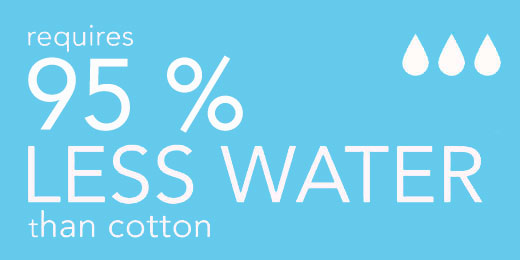Your cart is empty
Tencel® is a registered trademark for lyocell from textile manufacturer Lenzig and ranks very highly when it comes to eco-friendly textiles in terms of both raw material and production process.
Why is Tencel® more sustainable than other materials?
Tencel® is produced from eucalyptus trees. Its production is FSC-certified, which guarantees sustainable forestry practices. The trees used for production are replaced and the raw material production itself consumes CO2 and produces oxygen. Forestry takes place in areas that have no topsoil and therefore not in conflict with food production.

Tencel® is processed in a closed system. Tencel® requires far fewer chemicals than traditional viscose and around 100% of the chemicals are recycled. The remaining chemicals are purified. The production of Tencel® also requires less energy than the production of traditional rayon/viscose and uses 10-20 times less water than cotton.
What are the properties of Tencel®?
Tencel® is a durable, but soft and light fibre with excellent elasticity. The fibre has a smooth surface and feels softer against the skin than wool, cotton or silk. Clothing made of Tencel® has excellent moisture-wicking properties and absorbs 50 % more moisture than cotton. It is breathable, less prone to creasing and fast-drying. Like wool, Tencel® is naturally antibacterial and has up to 2000 less bacterial growth than synthetic fibres.
What characterises clothes made of merino wool and Tencel®?
Tencel® and merino wool are the perfect match. Both are sustainable natural materials and they share many of the same positive properties. Tencel® in wool blends contributes to greater moisture transport and helps the garment keep its shape. Clothing made of Merino wool and Tencel® feels soft against skin, helps you maintain a comfortable temperature, is stretchy, keeps its shape, is naturally antibacterial and self-cleaning, wicks moisture away from the skin to keep you dry and does not need to be washed as often as clothing made from other materials.
*Forest Stewardship Council
Source: Lenzing
